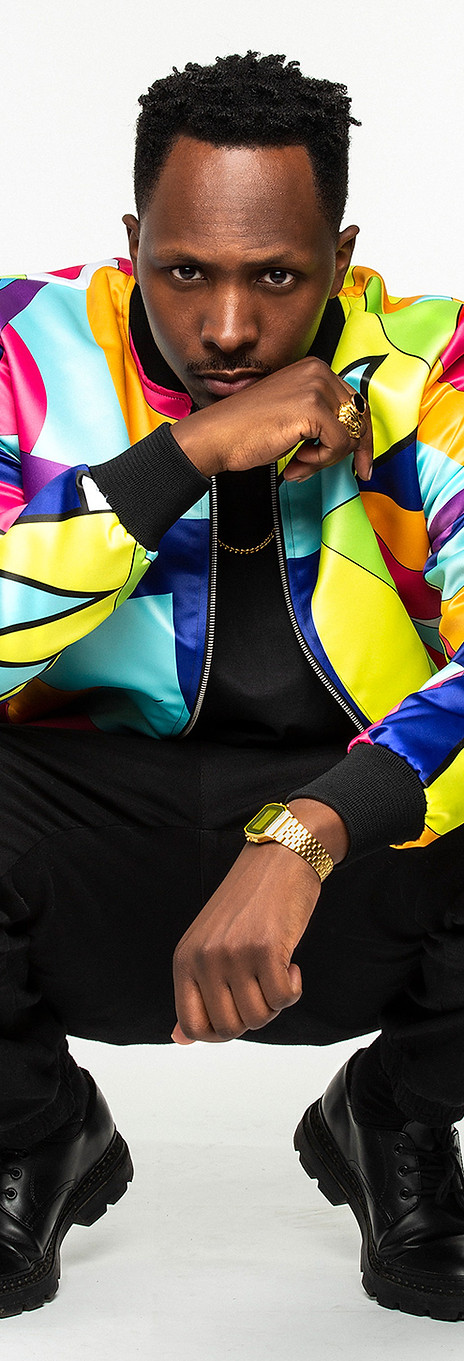
The man behind the artist
Baro's journey
Baro Sarré, real name Alhassane Baro Sarré, is a contemporary visual artist, born June 11, 1986 in Dakar, Senegal. He emigrated to France at the age of two with his Senegalese parents and grew up in an environment conducive to creativity.
He still lives today in the Paris region with his wife Sarah, an accomplished entrepreneur in the world of beauty, and their two children who inspire him every day.
Baro belongs to a happy family of eight children including a twin brother, all creative in their field. From a young age, Baro Sarré was passionate about drawing, influenced by cartoons, particularly Dragon Ball Z and by his older brother, who often draws. This fascination with drawing leads him to spend entire days creating and inventing characters, a passion that has never left him.
After a classical education, Baro Sarré entered a competitive examination for a school of Applied Arts in the Paris region, specializing in visual communication. This training reinforced his interest in graphic arts and modern technologies, laying the foundations for his current artistic signature. During his academic career, he explored drawing, painting and sculpture together. Later, he also trained in photography for his series "Human Spirit".


This curious person, this hyper-creative spirit, this history enthusiast and particularly that of Africa, this graphic design expert, passionate about art and Hip Hop, defines himself as an "Afropean" visual artist, in love with humanity.
The reinterpretation, in an ultra-modern digital aesthetic, of ancestral scarifications, these indelible marks engraved on faces, has become his artistic signature. Would we dare then to speak of an artistic “scar”?
In his designs inspired by the “Niass” as he calls them in the Wolof language, translating both beauty and resilience, individuality and universality,
Baro Sarré sees it as a form of writing that carries messages, allowing him to express the stories and emotions that are bubbling inside him.
Among the many facets of this fusion of identity that he explores through his art, we find a striking duality in the artist: on one side, an effervescence, an ardent passion, an overflowing solar energy, and on the other, an immense wisdom that he deeply connects to his African cultural heritage. Baro is a patient man, aware of the value of time and work, respectful of the words of the elders, and who has learned to listen more than to speak.
Interview
Baro in ten questions
Your favorite quote
“The eyes never forget what the heart has seen” African proverb
Your artistic “core”?
The ancient art of scarification.
Everyone knows and recognizes tattoos as an art form, but scarification is still little-known.
Your signature style?
Structured geometric motifs and a daring, impertinent harmony of colors.
The repetition of the motifs gives rhythm and captivating complexity to the work.
The colors bring emotional impact.
Your favourite artists?
Basquiat and Haring are emblematic figures for me, because they knew how to use art to express social and political messages, particularly racial inequalities. I admire their approach to making art accessible to all; they brought urban art into the cultural elite while retaining a link with the ordinary public.
Your influences?
There are many, many of them. Pop Art, Hip-Hop, the New York urban culture of the 1980s. There are also the Ndebel women of South Africa, known for their colorful, geometric murals, but Egyptian art has lines and structures that fascinate me too... Everything interests and influences me.
What's your essential for creating?
My family comes first!
And music; all styles of music from American rap to French variété.
A simple way to describe yourself?
A lover of humanity, passionate about human beings.
Everything fascinates me: our strength, our resilience, our intelligence, our beauty...
A favourite number?
The number eleven, because 1+1 represents the couple. And for me, who has a twin, the symbolism is even stronger.
My works are therefore in limited series of 11.
What do you think art's role is?
Art must bear witness to its times and convey messages.
It serves as a means of expression and communication to overcome cultural, linguistic and societal barriers, and to touch and inspire individuals.
What's the role of your art?
Celebrating the universality of human beings




